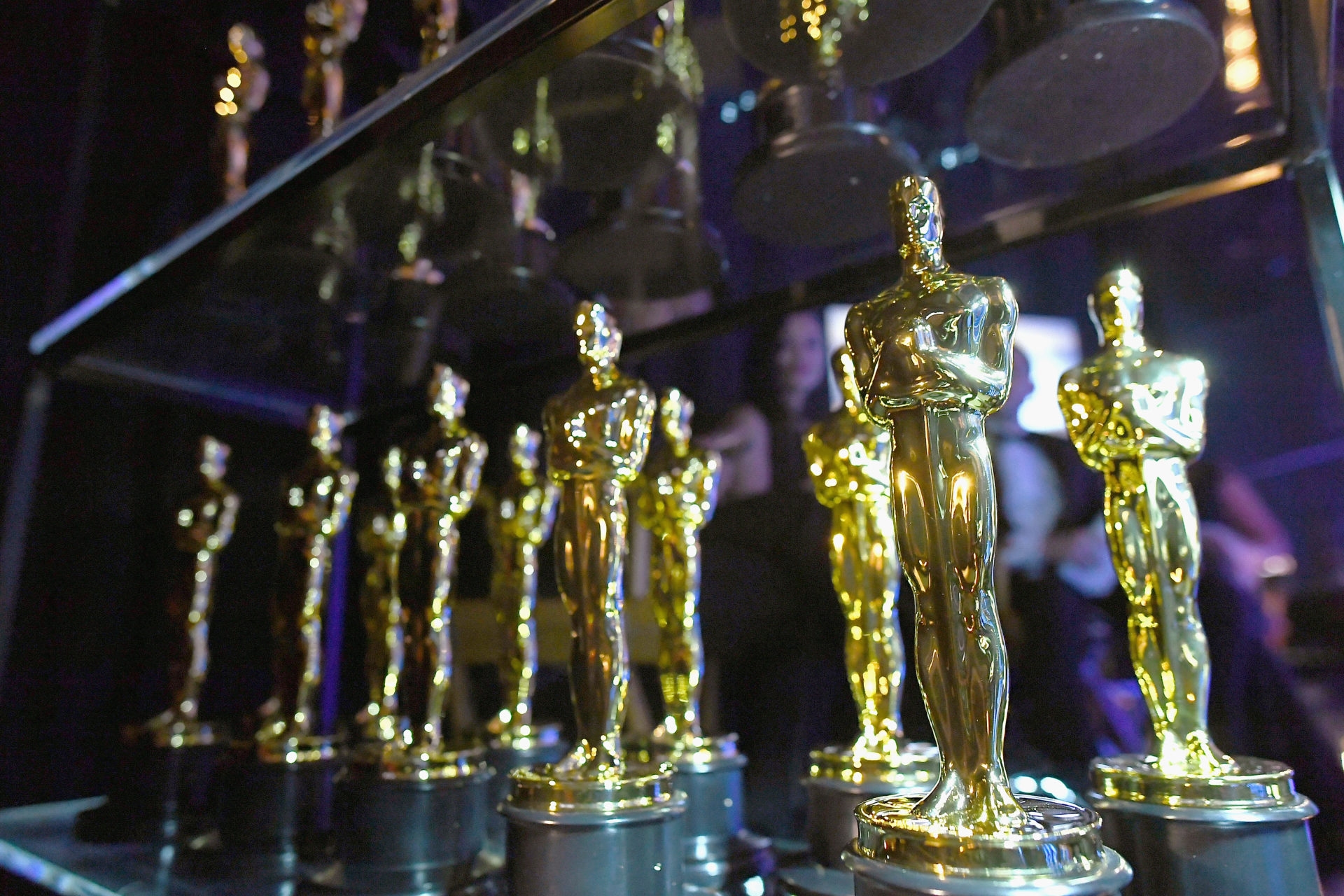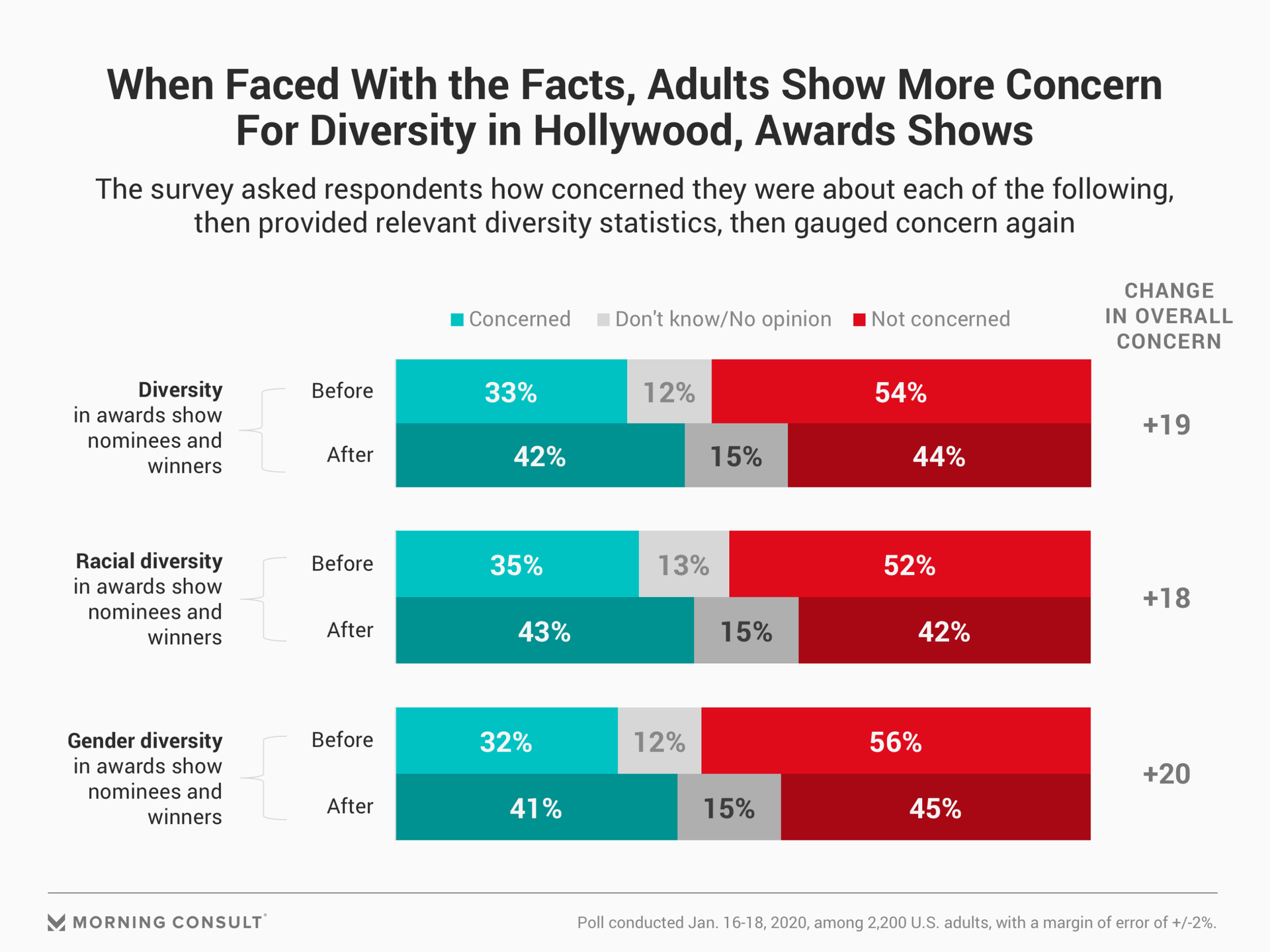People Worry More About Hollywood Award Diversity Once They See the Numbers

Key Takeaways
28% of those surveyed said two or three women had been nominated for best director from 2016 to 2020, when only one woman has been nominated over that period.
23% of respondents correctly said that four to five racial and ethnic minorities won Oscars for acting between 2015 and 2019.
Before seeing nomination and win numbers, 54% of respondents said they were not concerned about diversity, with that share falling 10 points after they were shown the statistics.
After incremental progress on diversity in recent years following 2015’s #OscarsSoWhite campaign, this year marked the return of a predominantly white group of acting nominees and an entirely male group of directing nominees to contend for the Academy’s gold statuettes. While previous polling has shown that U.S. adults generally have little concern for Hollywood diversity, a new survey finds the public changes its opinions when confronted with the real nomination and win numbers for the Oscars.
A Jan. 16-18 Morning Consult/The Hollywood Reporter survey asked 2,200 U.S. adults about their concern regarding diversity in the entertainment industry. A slim majority -- 53 percent -- said they were not concerned about the issue, while 54 percent said they were not worried about diversity among awards show nominees and winners.
Fifty-nine percent of African Americans, as well as 44 percent of Hispanics and 35 percent of women, said they were concerned about diversity among awards show nominees and winners. Two-thirds (67 percent) of African Americans and 51 percent of Hispanics said they were concerned about the racial diversity of awards show winners and nominees, compared to 35 percent of all adults. And women, at 34 percent, were 2 percentage points more likely than the public overall to say they were concerned about gender diversity related to awards.
The poll’s margin of error is 2 points. The subsamples of women, Hispanics and African Americans have margins of error of 3, 5 and 6 points, respectively.
When nominations for the 92nd Academy Awards were announced Jan. 13, the homogenous make-up of nominees in the acting categories (just one person of color was nominated) and the directing category (no women were nominated) drew backlash from online commentators and those within the industry, including presenter Issa Rae. “The Academy needs to do better,” she told CNN.
The poll showed that few people had a good sense of how different groups were represented in awards categories. The survey asked respondents how many individuals from different identity groups received nominations for best directing from 2016 to 2020. Twenty-eight percent said that two or three women had received nominations over that time period, while a quarter said four or five women had been nominated in the best director category.
But in reality, only one woman -- Greta Gerwig for 2017’s “Lady Bird” -- has been nominated in the category since 2016. One-third of respondents said that two or three women of color had been nominated for the prize during the specified time period; no woman of color has ever been nominated for the award.
Though acting categories in 2015 and 2016 were exclusively white, five of the 12 acting winners from 2017 to 2019 -- Viola Davis, Mahershala Ali (who won twice), Regina King and Rami Malek -- were racial or ethnic minorities. Twenty-three percent of respondents correctly guessed this, saying that four or five of the winners belonged to that category, while 34 percent said it was two or three.

Once survey respondents were shown how many people in each identity group had actually been nominated for or won the specific categories, the share who said they were concerned about diversity in the entertainment industry overall rose 6 points to 42 percent, while the share who said they were concerned about diversity specifically among award show nominees and winners rose 9 points to 42 percent.
And while a 48 percent plurality initially said women receive a fair amount of nominations, that number dropped 15 points after respondents were shown the stats. Similarly, 40 percent originally said racial and ethnic minorities received a fair number of nominations, but that share fell to 32 percent after seeing the number of nominations and wins from that group.
Sarah Shevenock previously worked at Morning Consult as a reporter covering the business of entertainment.
Related content

As Yoon Visits White House, Public Opinion Headwinds Are Swirling at Home

The Salience of Abortion Rights, Which Helped Democrats Mightily in 2022, Has Started to Fade
